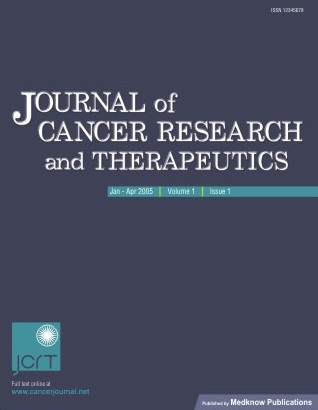
|
Journal of Cancer Research and Therapeutics
Medknow Publications on behalf of the Association of Radiation Oncologists of India (AROI)
ISSN: 0973-1482
EISSN: 0973-1482
Vol. 6, No. 3, 2010, pp. 272-277
|
 Bioline Code: cr10062
Bioline Code: cr10062
Full paper language: English
Document type: Research Article
Document available free of charge
|
|
|
Journal of Cancer Research and Therapeutics, Vol. 6, No. 3, 2010, pp. 272-277
| en |
Assessment of compliance to treatment and efficacy of a resource-sparing hypofractionated radiotherapy regimen in patients with poor-prognosis high-grade gliomas
Gupta, T.; Dutta, D.; Trivedi, S.; Upasani, M.; Jalali, R. & Sarin, R.
Abstract
Introduction: The optimal radiotherapeutic management of poor-prognosis (elderly and/or poor performance status) high-grade gliomas (HGG) remains controversial. Hypofractionated radiotherapy (hypoRT) has been shown to be non-inferior to daily conventionally fractionated radiotherapy. This study aimed to assess the compliance to treatment and efficacy of a resource-sparing hypoRT regimen in this subset.
Materials and Methods: The resource-sparing hypoRT regimen was delivered once weekly (5Gy/fraction) for seven fractions to a total dose of 35Gy in seven fractions over six weeks. Compliance to planned treatment and factors that could potentially influence it were analyzed.
Results: Between January 2004 and October 2009, 63 patients with poor-prognosis HGG (age range 40-78 years; Karnofsky performance score ≤70) were offered resource-sparing hypoRT regimen. Twenty eight of 63 patients completed planned course of treatment giving a treatment compliance rate of 44%. Six (9.5%) patients did not receive even a single fraction of radiation after simulation/planning. Thirty eight patients (60%) received ≥3 fractions and were on treatment for at least two weeks. Performance status (P=0.05) and grade (P=0.04) significantly impacted upon compliance. Median overall survival for the cohort of 28 patients who completed planned course of treatment was 7.4 months (95% confidence interval: 4.4-10.5 months).
Conclusions: The treatment compliance to a resource-sparing once-weekly hypoRT regimen in poor-prognosis HGG has been somewhat suboptimal and discouraging, possibly due to the protracted scheduling over six weeks. Over 60% of patients were on treatment for two weeks, suggesting that short-course schedules could more likely ensure compliance.
Keywords
Compliance, high-grade glioma, hypofractionated radiotherapy, poor-prognosis
|
| |
© Copyright 2010 Journal of Cancer Research and Therapeutics.
Alternative site location: http://www.cancerjournal.net/
|
|
